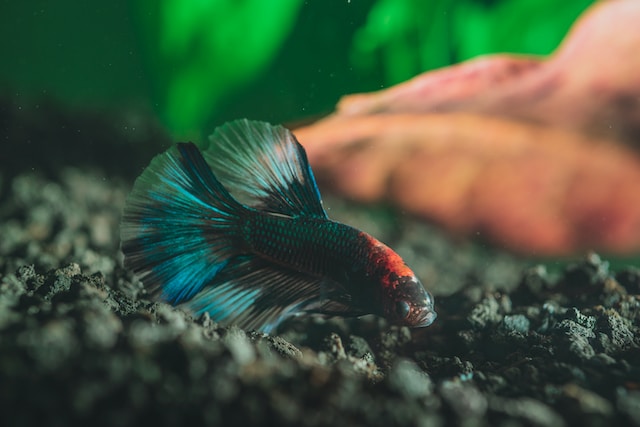Table of Contents
As a betta fish owner, you want your pet to be happy and healthy. But how can you tell if your betta fish is unhappy? In this article, we’ll explore the signs that indicate a betta fish is unhappy, including changes in behavior and physical appearance. We’ll also provide insights into the different factors that can impact the happiness of betta fish, and offer tips on how to properly care for them to ensure their well-being.
Whether you’re a seasoned aquarium owner or a first-time betta fish parent, you’ll gain a deeper understanding of the signs of an unhappy betta fish and how to provide them with an enriching environment. So, if you’re ready to learn more about how to tell if your betta fish is unhappy, let’s dive in and get started!
One of the most common signs to tell if your betta fish is unhappy is a lack of activity. Bettas are naturally curious and active fish, so if you notice that your fish is spending most of its time hiding or not moving much, it may be a sign that they are unhappy.
Other signs to tell if your betta fish is unhappy – loss of appetite, lethargy, and changes in color or behavior. It’s essential to pay close attention to your betta’s behavior and appearance to ensure that they are happy and healthy.
If you suspect that your betta fish is unhappy, there are several things you can do to improve their quality of life. Bettas need a clean and spacious environment to thrive, so make sure that their tank is properly maintained. Additionally, bettas are social creatures and enjoy having things to interact with, such as plants or toys.
Understanding Betta Fish Behavior
Betta fish are known for their vibrant colors and flowing fins, but they also have unique behaviors that can indicate their mood and overall health. Understanding these behaviors can help you identify when your betta fish is unhappy and take steps to improve their well-being.
Swimming Patterns
Betta fish are active swimmers and should be swimming around their tank regularly. If you notice that your betta fish is staying in one spot for extended periods or is not swimming at all, it may be a sign of illness or stress. On the other hand, if your betta fish is constantly darting around the tank, it may be a sign of aggression or overstimulation.
Eating Habits
Betta fish are known to be voracious eaters, and a healthy betta should have a healthy appetite. If your betta fish is not interested in food or is only eating a small amount, it may be a sign of illness or stress. However, overeating can also be a problem, so make sure to feed your betta fish the appropriate amount of food.
Coloration
Betta fish are known for their vibrant colors, and changes in color can indicate changes in mood or health. A stressed or unhappy betta fish may lose its vibrant coloration and become pale or dull. Additionally, if your betta fish is turning black or has black spots, it may be a sign of a bacterial infection.
Fin Positioning
Betta fish have long, flowing fins that can indicate their mood and overall health. If your betta fish’s fins are clamped or held tightly against its body, it may be a sign of stress or illness. However, if your betta fish is constantly flaring its fins, it may be a sign of aggression or overstimulation.
By understanding your betta fish’s behavior, you can identify when they are unhappy and take steps to improve their well-being.
Signs of Unhappiness
If you notice that your betta fish is not as active as usual, it could be a sign that they are unhappy. Betta fish are naturally active and curious, so if they are spending most of their time hiding or resting at the bottom of the tank, it could be a sign that something is wrong.
Another sign of unhappiness in betta fish is a lack of appetite. If your fish is not eating or only picking at their food, it could be a sign that they are not feeling well or are stressed. It’s important to monitor your betta’s eating habits and make sure that they are getting enough food.
Stress can also cause physical symptoms in betta fish, such as a loss of color or frayed fins. If you notice that your betta’s colors are dull or their fins are frayed, it could be a sign that they are stressed or unhappy. In some cases, stress can even lead to illness or disease, so it’s important to address the issue as soon as possible.
Finally, if your betta fish is constantly flaring their gills or fins, it could be a sign that they are feeling threatened or stressed. Flaring is a natural behavior for bettas, but if it becomes excessive or is accompanied by other signs of unhappiness, it could be a cause for concern.
Changes in Eating Habits
If you notice changes in your betta fish’s eating habits, it could be a sign that they are unhappy. Here are a few things to look out for:
Loss of Appetite
If your betta fish is not eating as much as they used to, or not eating at all, it could be a sign that they are unhappy. There are many reasons why a betta fish might lose their appetite, such as stress, illness, or a poor diet. Make sure that your betta fish is getting the right nutrition and that their tank is clean and well-maintained. If you suspect that your betta fish is sick, take them to a veterinarian who specializes in fish.
Overeating
On the other hand, if your betta fish is overeating, it could also be a sign that they are unhappy. Overeating can lead to health problems such as obesity, constipation, and swim bladder disease. Make sure that you are feeding your betta fish the right amount of food and that you are not overfeeding them. A good rule of thumb is to feed your betta fish only as much as they can eat in two minutes.
Physical Changes
Betta fish are known for their bright colors and flowing fins, but when they are unhappy, their physical appearance can change. Here are some physical changes to look out for:
Color Changes
One of the most noticeable changes in a betta fish’s appearance is a change in color. If your betta fish is unhappy, you may notice that its colors become dull or faded. This is because stress can cause the fish to produce less pigment. On the other hand, some bettas may become darker or more vibrant in color when they are stressed. This is a natural response to stress and is known as “stress stripes.”
Fin Damage
Another physical change to look out for is damage to the betta fish’s fins. When a betta fish is unhappy, it may start to nip at its own fins or rub them against objects in the tank. This can cause the fins to become ragged or even develop holes. Additionally, if the water in the tank is not clean, the betta fish’s fins may become frayed or develop fin rot.
To prevent fin damage, make sure your betta fish has plenty of space to swim and explore. Keep the water in the tank clean and free of harmful chemicals. Also, avoid placing any sharp objects or decorations in the tank that could damage the betta fish’s fins.
Behavioral Changes
If you suspect that your betta fish is unhappy, one of the first things you should look for is changes in their behavior. Betta fish are known for their active and curious nature, so if they suddenly become lethargic or aggressive, it could be a sign that something is wrong.
Lethargy
One of the most common signs of an unhappy betta fish is lethargy. If your fish is spending more time at the bottom of the tank or not swimming around as much as usual, it could be a sign that they are unhappy. Other signs of lethargy include:
- Reduced appetite
- Less interest in their surroundings
- Lack of response to stimuli
If you notice any of these signs, it’s important to investigate further to determine the cause of your betta’s lethargy. It could be due to poor water quality, an illness, or even stress from overstimulation.
Aggression
Another behavioral change to look out for is aggression. While betta fish can be territorial, excessive aggression can be a sign of unhappiness. Signs of aggression include:
- Flaring their gills and fins
- Chasing or nipping at other fish in the tank
- Attacking their own reflection in the tank
If your betta fish is displaying aggressive behavior, it’s important to ensure they have enough space in their tank and are not feeling threatened by other fish or objects in their environment. It’s also important to note that aggression can be a sign of illness or stress, so it’s important to monitor your fish closely and seek veterinary care if necessary.
Remember, changes in behavior can be a sign that your betta fish is unhappy, but they can also be a sign of illness or stress. By monitoring your fish’s behavior and taking steps to ensure they have a healthy and comfortable environment, you can help keep your betta fish happy and healthy.
Changes in Swimming Patterns
One of the most obvious signs that your betta fish is unhappy is changes in their swimming patterns. Normally, a healthy betta fish will swim around their tank with ease, displaying their beautiful fins and exploring their environment. However, if your betta fish is unhappy, you may notice changes in their swimming patterns.
If your betta fish is unhappy, they may start to swim more slowly or lethargically. They may also spend more time resting at the bottom of the tank or hiding behind decorations. On the other hand, if your betta fish is stressed or anxious, they may start to swim more erratically or frantically, darting around the tank and bumping into objects.
Another sign of an unhappy betta fish is if they start to lose their balance or have difficulty swimming. This can be caused by a number of factors, including illness, poor water quality, or a lack of stimulation in their environment. If you notice your betta fish struggling to swim, it is important to take action to address the underlying cause of the problem.
How to Improve Your Betta Fish’s Happiness
If you’ve noticed that your betta fish seems unhappy, there are a few things you can do to help improve its quality of life. Here are some tips for creating a happy and healthy environment for your betta fish.
Proper Tank Conditions
One of the most important things you can do to improve your betta fish’s happiness is to ensure that its tank conditions are optimal. This means maintaining a clean and well-filtered tank, with the right temperature and lighting. Here are some key factors to keep in mind:
- Tank size: Bettas need at least a 5-gallon tank to thrive, so make sure your tank is big enough.
- Water quality: Bettas are sensitive to poor water quality, so make sure to perform regular water changes and keep the tank clean.
- Temperature: Bettas prefer warm water between 76-82°F, so make sure to keep the tank at a consistent temperature.
- Lighting: Bettas need a regular day/night cycle, so make sure to provide adequate lighting during the day and darkness at night.
Balanced Diet
Another key factor in your betta fish’s happiness is its diet. Bettas are carnivorous and need a diet high in protein. Here are some tips for providing a balanced diet:
- Feed high-quality betta food: Look for betta-specific food that is high in protein and contains a variety of nutrients.
- Supplement with live or frozen food: Bettas also enjoy live or frozen food like brine shrimp or bloodworms, which can provide additional nutrients and stimulation.
- Avoid overfeeding: Overfeeding can lead to obesity and other health problems, so make sure to feed your betta fish the right amount.
Stimulation and Enrichment
Finally, it’s important to provide your betta fish with stimulation and enrichment to keep it happy and healthy. Here are some tips:
- Add plants and decorations: Bettas enjoy swimming through plants and decorations, which can provide a sense of security and stimulation.
- Provide hiding spots: Bettas also need hiding spots where they can retreat when feeling stressed or threatened.
- Add a mirror: Bettas enjoy seeing their reflection in a mirror, which can provide stimulation and exercise.
- Change the tank layout: Switching up the tank layout every once in a while can provide new stimulation and prevent boredom.
When to Consult a Vet
If you have followed all the tips and tricks to keep your betta fish happy, but it still seems unhappy, it may be time to consult a veterinarian. Here are some signs that your betta fish may need medical attention:
- Lethargy: If your betta fish is not swimming around as much as usual and seems to be spending most of its time at the bottom of the tank, it may be a sign of illness.
- Loss of Appetite: If your betta fish is not eating as much as usual or has stopped eating altogether, it may be a sign of illness.
- Discoloration: If your betta fish’s color has changed dramatically or if it has developed spots or lesions, it may be a sign of illness.
- Abnormal Swimming Behavior: If your betta fish is swimming erratically or seems to be having trouble swimming, it may be a sign of illness.
If you notice any of these signs, it’s important to consult a veterinarian who is experienced in treating fish. They can help diagnose the problem and recommend a treatment plan.
In addition, if you have any concerns about your betta fish’s health, it’s always better to err on the side of caution and consult a veterinarian. Fish can be very sensitive to changes in their environment, and even small changes can cause stress and illness. A veterinarian can help you identify any potential problems and provide advice on how to keep your betta fish healthy and happy.







